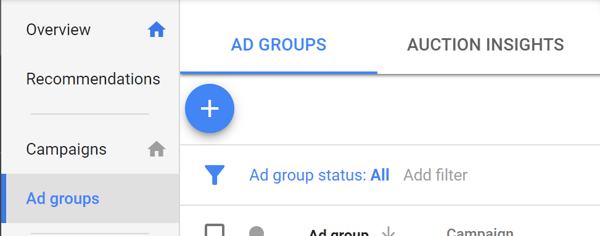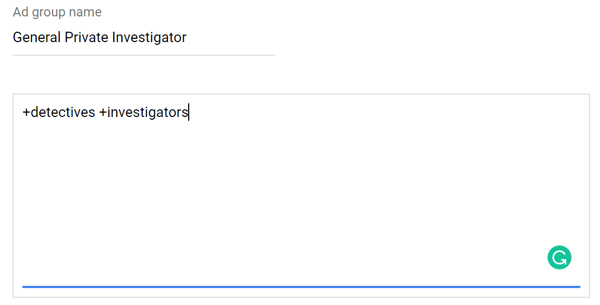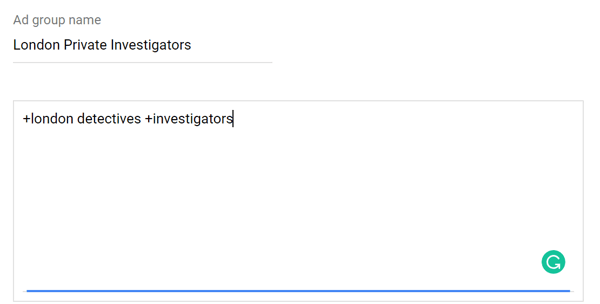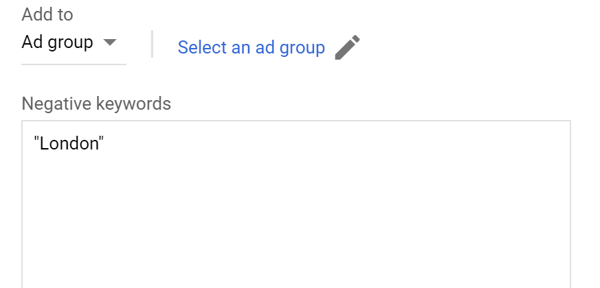6 Actionable Adwords Optimisations You Can Try RIght now
October 14, 2018

 7
7
min
Business to business, business to customer or human to human - however you describe your business, your customers are still googling their problems and finding solutions in the form of paid search ads.
In fact, the value of PPC can be summed up in one stat: 95.3% of clicks through Google go to the top 4 results.
But, just having an account and paying the bill every month isn't the golden ticket. You need to think about optimisation.
Here are 6 actionable adwords optimisations you can try right now to improve your PPC game.
Match Type Experimentation Pays
Don't Delete Non-converting Keywords
1. Experiment with Your Match Types
For those new to PPC, you'll quickly learn that there are different match types for your keywords. The big ones are as follows:
- Broad Match - You'll appear for plurals, synonyms and more. You're really casting your net wide here.
- Phrase Match - You'll only appear to users who have typed in your phrase in exactly the same way you've typed them. Anything around that phrase, Google will try to match up search intent.
- Exact Match - With exact match you'll only ever appear for people who search for exactly what you've specified in exactly that order.
But, what many first starting out don't realise is that it pays to experiment and start introducing less traditional match types.
Introducing "broad match modified". A powerful match type that Google doesn't recommend.
Ideally, you want something between broad and exact match. You want something broad that can capture the things you might not have thought of, but your ad to be shown to someone who is searching with intent.
Here are some examples that demonstrate the power of broad match modified:

With companies looking to bid for niche keywords, broad match modified can be a real big boost to your bid strategy by requiring certain keywords to be in a users search to trigger one of your ads.
If you’ve been looking for a way to increase your qualified traffic, BMM is a great new opportunity for religious exact and phrase match users.
Start experimenting by:
- Creating new ad groups for keywords that you want more exposure on using the “+” modifier
- You will want to set a lower CPC for the BMM version of your keyword to minimize ad-poaching
- Take advantage of the new Google Analytics AdWords reports and watch your search queries closely for negatives
This was especially useful for us. We recognised three issues when we started running PPC.
- There is massive search volume for radio advertising, but only because a lot of people wanted to search for brands, buy a radio or listen to their favourite station. There was lots of wastage here.
- The search volume for radio advertising was significantly lower.
- There are potential advertisers all over the country and many of them seem to search with their regions in mind.
Rather than listing all the regions of the country with exact match, Broad match modified allowed us to require the use of the word advertising. This meant that whatever region they searched for, we'd be able to capture them.
Using broad match modified enhanced the amount of qualified leads we were getting because it almost guaranteed purchase intent.
|
I'm sure even the most experienced of PPC experts will sometimes be surprised with the searches they get through that actually end up being qualified. If there is one thing I would repeat over and over again to those starting their PPC campaigns it's this: there is no such thing as a perfect campaign. You'll never have all the relevant keywords and you'll never be able to fully predict your customers searches - that's why staying broad and flexible is a great strategy to lead with. Using broad match modified means you're open to searches or variations on searches that you maybe didn't think of while also staying relevant for searchers who are searching exactly what you want them to. |
2. Don't Jump To Delete Non-Converting Keywords
This may seem counterintuitive but hear me out.
It’s true, a keyword is only as good as the search intent powering it.
However, that intent is quickly diluted by poor relevance between what the searcher wants, what the advert promises and what the destination page delivers.
Rule of Thumb; If the cost per click for a particular keyword is consistently high, it’s usually an indication that people are bidding high because it is profitable to do so.
Before you jump to pause a keyword it's a good idea to stop what you're doing and run through this checklist of other problems first:
- Does your campaign only have a few large ad groups?
- How many Broad Keywords are in each ad group?
- How many negative Keywords have you been listing?
- Do you have good consistency between your ad and landing page?
If you can go through that list with a row full of green ticks then be my guest, delete that keyword because it's just not working out for you!
3. DON'T PUT TOO MUCH FOCUS on Quality Score
Quality score, although having a correlation with where your add is placed, shouldn't be the be all and end all of your Adwords optimisation. In fact, focusing too much on what Google suggests as far as landing page relevance and ad relevance, can lead to poor usability and on page experience for the person viewing your ad or landing page.
It's the same lesson we learn when approaching SEO. Writing like you have a keyword tick isn't enjoyable to read for the user and 9 times out of 10 they'll realise the not so subtle attempt at trying to match up their searches with your product.
The rule of thumb here should quite simply be to focus on providing a solution to those viewing the ads.
If they're clicking then they have a problem or need. Your landing page should explore the problem or need, provide empathy and a solution.
It should not be a regurgitation of the keyword to please the google algorithms.
4. Put Down The Copywriting Rule Book
In some cases you only have 30 words to get people to click. Whatever you do with your copy, you need to do it efficiently and effectively.
I'd be lying if I didn't say that listing your unique value proposition, your benefits and your discounts isn't effective, but with something like adwords, where you have so little real estate, it can really pay to come from the left field.
Consider the following tips when writing your adwords copy:
- The Value of a Question – In online copy, just like in social media, users generally get more value from a question than a statement. Is there a question you can ask to get your customers thinking about their own situation and your products/service relationship to that situation?
- Don't shy away from industry problems, embrace them – In most cases, copywriters shy away from the problems in an industry or with a product but if you embrace them and show that you both care and can provide a remedy, you're quids in.
- Negative Emotions can be just as powerful as positive ones – For this one, we'll use an example:

They're relying on the old faithful: list the benefits, use emotive language.
Subverting expectations - Are They Safe.co.uk
The above tactics are pretty safe bets, but there is opportunity for advertisers to break the mold and try something a bit different. Are They Safe, instead of squashing fear amplified it with a questions: Do you need to know the truth?

So what's happening here? When someone asks you a question, what do you do? I'd bet you think about it in relation to your own experience. Are They Safe will know that if their ads are appearing someone has to have searched with intent, that usually means they have a problem. Asking a question like this, as opposed to highlighting the benefits of working with you, brings that problem to the forefront and, through use of the second person singular pronoun 'You', offers a pseudo personalised experience for people searching.
5. Keyword Sculpting
This may sound like the punchline of a lot of different movies but, when it comes to starting out with Adwords, your biggest enemy is yourself. Yes, your adwords will compete and clash with each other.
It may seem from where you're sitting that your keywords are working together, covering all the bases and catching all of your customers. Well, in actual fact they're competing against each other.
Let's revisit our previous example of the private detective.
You may begin your campaign with more general keywords such as +Detectives +Investigation. However, as the data comes in you find that you are getting crushed in your click through rate (CTR) and quality score. You scramble and decide to create an ad group that specifically targets your location and includes location based keywords such as +London Detective +London Investigator +London Investigation and create ads that specifically target the London area.
To get the ROI you deserve you need to eliminate yourself from the competition through keyword sculpting.
Sculpting an AdWords account means strategically adding negative keywords to Ad Groups which forces Google to only show the ads for the keywords you intended.
These negative keywords prevent your keywords from competing with each other. When an AdWords account is sculpted correctly there is an increase in relevance and quality score and a decrease in the average cost per click.
To do this you'll want to make two ad groups in the same campaign. One for general terms and another for location specific terms:

Then add your keywords to each ad group, making sure the London ad group is targeted to London.


Then make ads that use the keywords you've chosen.
|
Make sure you're using all the real estate that Google offers to you, including all the extensions that advertisers often don't realise are there. These 3 are the ones that you want. Regardless of industry, they'll come in handy. Sitelink Extension Sitelink Extensions are additional links that you can add to your search ad. These allow searchers to see all your various offerings up front so their click is more relevant to their needs.
Callout Extensions Callout extensions are similar to Sitelink Extensions, without the clickable links. They allow you to provide additional detail and relevance to your ad while maintaining a laser-focused call-to-action.
Structured Snippet Structured Snippet Extensions provide advertisers three additional header lines of text to highlight key aspects of your business, including:
|
If you were to leave it here you'll start to notice that your ads for the general ad group are being shown for both ad groups, even though you've made an ad specific for each ad group. Even when a user specifically searches on the phrase London Private Detective the ad from the General Investigator ad group appears.
To sculpt our keywords, we'll need to add negative keywords to the generic ad group.
To do that, navigate to your ad group, then to keywords and finally, to the negative keywords tab. Pressing the blue plus will open up a text box.

In the text box you'll want to add London as a negative phrase match by typing in London in quotes and selecting save.

Now when a user types in London Private Detective the general ad does not show. Only the highly targeted London ad is now the only eligible.
6. Bid Popping
Earlier we talked about shying away from focusing on quality score too much, but if it's something that's really troubling you then you can use a bid popping strategy to improve it.
Bid popping involves strategically boosting your bids for a short period of time to artificially spike your click through rate which will improve your quality score and ad rank.
Here's how to execute the perfect bid pop:
- Increase your bids by a reasonable amount for limited period for best performing ads (by CTR)
- This will increase your CTR which will improve your Ad Rank
- You can then reduce your bids slowly to find the right cost per conversion
- This may save money in the longer term as your ad will have a higher Ad Rank
- This is often used after a few weeks of a campaign to try and build a better Ad Rank

